- Home
- Shirlee McCoy
The House on Main Street Page 8
The House on Main Street Read online
Page 8
Soon.
Very soon.
Because Alex needed to be in Apple Valley.
Her eyes burned, and she blinked rapidly.
“Don’t cry.” Cade’s hand slid from her thigh to her waist, his fingers wrapping in the belt loop of her jeans.
“I’m not,” she mumbled, her throat so tight she almost choked on the words.
“You were thinking about it, though.”
He was right. She’d been thinking about crying, but it was a colossal waste of time and energy. So was sitting with Cade. Seriously! Hadn’t she learned anything during the past ten years? Men were trouble for women like Tessa, because she was just like her good-for-nothing mother . . . attracting guys who were good at acting the part of caring, concerned boyfriends, but who weren’t so good at being them.
Take Kent for instance. He’d had it all. A great job as an electrical engineer, money, looks, charm. What he’d lacked was heart. And, apparently, a conscience. He’d barely blinked an eye when she’d thrown the sexy little silk teddy that she’d found under their bed in his face.
She didn’t wear sexy lingerie. She wore boxers and tanks. Which, according to Kent, had been part of their problem.
Bastard!
She brushed Cade’s hand away and extracted herself from his very warm, very tempting embrace. “I’d better get back to work. Thanks again for bringing Alex home. We’ll talk to him and make sure he doesn’t leave school again.”
He nodded, his eyes dark with something she didn’t plan to acknowledge, his gaze raking over her in the kind of slow once-over a man usually reserved for a woman who’d captured his attention.
A dozen years ago, she probably would have swooned at the thought of Cade Cunningham looking at her like that. Now, she just felt tired.
She stalked to the ladder and clambered up, setting the scraper against a chunk of old paint.
A car door slammed, but she didn’t glance down at Cade’s police cruiser. She wasn’t going to wave good-bye. She’d thanked him and that was good enough. A few seconds ticked by. Nothing. Not a cough or purr. No sign that Cade was heading back to work.
“Hey, Red!” he called from right below her, and she nearly tumbled off the ladder. “Hold tight. I’m coming up.”
“You can’t—”
Too late. The ladder shimmied under his weight, and she grabbed a windowsill to hold herself steady. “What in the heck are you doing, Cade?”
“You need a hat.” His body brushed hers, every inch of his chest and thighs pressed to every inch of her back and hips.
She froze. Afraid to breathe. Not because she was afraid she’d tip the ladder if she did, but because inhaling brought her that much closer to Cade. “I do not need a hat,” she muttered.
“It may be forty degrees, but the sun is still brutal.” He plopped a baseball hat on her head, his fingers brushing through her ponytail. “There you go,” he murmured, his lips so close to her ear, she could feel the warmth of his breath.
If she turned her head just even the tiniest bit . . .
But of course she wouldn’t.
Ever.
Because she was done with men. Completely and forever done.
“Thanks.” She made a big show of working off a chunk of paint, her body so stiff from trying not to touch any part of Cade that she thought a gentle breeze would snap her in two.
“No problem,” he responded easily, his voice completely unchanged. No hint that he felt anything other than what they both should . . . the cold ashes of old friendship. The ladder shimmied again as he made his way down.
This time he didn’t return.
The car door slammed. The engine roared. The cruiser rumbled away.
Good. Great. Wonderful even, because standing on a ladder, scraping paint off her sister’s house, was exactly what Tessa wanted to do.
And she wanted to do it alone.
Even if forty degrees did suddenly feel like seven below, and even if the weight of Cade’s baseball hat felt like every dream Tess had ever let die.
She sniffed hard, because it was cold and her nose was running. Not because she still felt like crying.
Behind her, the old swing creaked, its rusty chains groaning quietly. She didn’t look down. She was almost afraid of what she’d see. Maybe Emily’s ghostly form, looking up at her and laughing, telling her to go with the flow and let things happen.
Only letting things happen had never gotten Emily anything but trouble, and Tessa had always been the one walking along behind her, cleaning up the messes she left behind.
Piano music drifted from the house, the same sad and haunting melody Alex had played before, each note a wordless cry for something he needed that Tess couldn’t provide.
Maybe she’d figure it all out eventually. Maybe she wouldn’t be as colossal a failure at parenting as her mother had been.
Either way, she could fix the house up. Find away to make some money and keep Alex in the place he loved. If that was all she could give him, at least he’d have that.
The rest . . . ?
A wing and a prayer. That’s what Gertrude used to say when they’d been so poor that she’d stalked the garbage bin behind Goodwill to find school clothes for Tess and Emily.
We may make it on a wing and a prayer, but we’ll make it.
Hopefully, that would prove true this time, because Tessa didn’t have a plan B. She wasn’t even sure she had a plan A.
Chapter Seven
Tessa scraped paint until her palm was raw and her fingers ached. If the sun hadn’t started to go down and a cold wind hadn’t started blowing, she probably would have kept going until she didn’t have a bit of skin left on her hand. It just seemed so much easier than going inside.
She lugged the ladder into the backyard and shoved it into the old storage shed, pushing it in between an old table and an older rocking chair. She didn’t know what else was in there. She hadn’t had the courage to look through the stuff crammed into the building. Dave and Emily hadn’t believed in throwing things away.
She dragged the rocking chair out and brushed off a thick layer of dust. An eon ago, someone had painted it baby blue and covered the seat in 1970s plaid, but the chair dated from the 1860s, the high back stylized with gorgeous lines. Restored, it would be worth a pretty penny.
“You planning to come in anytime tonight?” Gertrude called from the corner of the house. “I made fried chicken.”
Tessa wasn’t hungry, but she couldn’t say no to Gertrude’s fried chicken. It was a peace offering. A truce. The same thing she’d offered when Tessa was a kid and they’d been at odds. Neither willing to back down. Both sorry. A stalemate with no way out. Every time it happened, Gertrude pulled out her great-grandmother’s fried chicken recipe, and every time, Tessa ate it.
She’d eat it this time, too. Even if it choked her.
“I’ll be right in,” she said.
“What have you got there?” Gertrude walked across the yard.
“An old rocking chair.” She refrained from mentioning that it had been left to rot in a cluttered shed. This was a truce, after all.
“It was probably in the house when Emily moved in. She wasn’t keen on the old-fashioned furniture that was here, but Dave wouldn’t let her throw it out.”
“Smart guy.”
Gertrude frowned, and Tessa hurried to continue. No way did she want to start the feud again. “I mean that, Gertrude. This is a good piece. Once all this paint is stripped off—”
“How about you tell me about it over dinner? Alex hasn’t eaten yet, and he’s probably hungry.” There was no denying the worry in her voice, and Tessa couldn’t find it in herself to be even moderately annoyed at being cut off.
“Sure.” She lifted the rocking chair, grunting a little under its weight. She really needed to get back into some kind of workout routine. A week and a half away from the gym, and she was already starting to feel soft.
“You’re bringing that inside?” Gertrude asked a
s they walked around the side of the house together.
“For now,” Tess panted. The thing was heavy. Much heavier than she’d anticipated.
“Weren’t you the one who was talking about clearing things out of the store?”
“Yes, but this is something we can sell once it’s restored.” She stumbled up the porch stairs and dropped the chair near the door.
“How much do you think something like that will bring?” Gertrude lit a cigarette and blew a puff of smoke into the frigid air. “Once it’s fixed up.”
“If I were selling it in Annapolis, five hundred. Here? Maybe two.”
“Two, huh?” Gertrude touched the faded plaid cushion. “That’s not bad.”
“No, and there are dozens of pieces stacked around the house. Nice vintage pieces, some really nice antiques. If we sell some of those—”
“It’s a good thought, Tess. It really is, but there are certain things we’ve got to keep. They’ve been in the house for a hundred years. They need to stay here.”
“Like the angel you gave to Cade?” The question just slipped out, landing right square in the middle of their very nice truce. Damn it!
Gertrude tensed, her lips pressed together, the cigarette dangling from between her fingers. “You’re probably right. I probably shouldn’t have done that.”
The acquiescence shocked Tess speechless.
She stared at her aunt, not sure if she should feel her forehead for a fever or call the men in white coats to come and take her away.
“What?” Gertrude took a puff of the cigarette and then flicked it out into the yard.
“Are you sick, Gertie?”
“What kind of fool question is that?”
“I’ve known you for twenty-three years, and I’ve never, ever heard you say you were wrong before.”
“There’s a first time for everything. Come on. Let’s go eat.” She led the way into the house, and Tess followed, leaving the heavy chair exactly where it was. No one would take it off the porch. Not in Apple Valley.
The house was quiet, the stairs creaking as Tessa hurried upstairs. No piano music. Thank goodness! Alex had given up on his melancholy song soon after he got home from school. The music had been ringing through Tessa’s head since then, though. No matter how hard she’d tried, she hadn’t been able to shake it.
The scent of fried chicken and chocolate cake filled the apartment. Gertrude had gone on a cleaning frenzy, too. Every piece of furniture gleamed and the old wood floor nearly sparkled. There wasn’t a dirty pan in the sink or on the counter. Not a speck of dust anywhere.
“You’ve been busy,” she said.
“We both have been. Now it’s time to take a break.” Gertrude grabbed plates from a cupboard and dropped them onto the table. “Alex, come on, son! It’s time to eat.”
The door at the end of the hall opened, and Alex shuffled out, his skin pale, his hair ruffled. He had a block car in his hands. Some snapped-together creation. He was almost as good at making things as he was at composing music.
“What did you make?” Tessa asked as he sat at the table. He didn’t respond, his head bent as he stared at something on the table. A spot? A speck? Whatever it was, it was obviously more interesting than Tessa.
“Don’t be rude, Alex,” Gertrude chided. She sounded tired, the weary edge to her voice reflecting the weariness of the house. The faded paint and worn throw rugs, the tired furniture that made a sad attempt to be cheerful. Emily had done well with what she’d had, but there was a vibe of unhappiness to the place, a hint of discontent.
“It’s okay. I think we’re all a little tired,” Tessa offered, smiling at Alex even though he was still staring down at the table.
“That has nothing to do with being rude. Alex knows he’s supposed to respond when he’s spoken to.” Gertrude put a plate of steaming fried chicken on the table and shot Tess a hard look.
It seemed like their truce was going to end before it even began. Tess put chicken on Alex’s plate and a piece on her own. Dug into the baked macaroni and the fresh coleslaw that Gertrude slammed onto the table.
Yeah. The truce was over.
But at least they’d tried. For all of three seconds.
The doorbell rang, the sound cutting through the tension and the silence. It was as good an excuse as any for Tessa to leave her plateful of food and the table. “I’ll get it.”
She ran down the stairs, tripping all over herself in her hurry to get out. She braced herself as she opened the door, sure it was Zim coming to tell her that she hadn’t done enough to clean up the mess. “Don’t worry . . .”
The words trailed off as she looked into Ida Cunningham’s stunning face. The woman had to be eighty, but she looked a couple of decades younger, her face lined with years of smiling, her eyes the same deep denim blue as Cade’s.
“I wasn’t worried. Not particularly,” she said with a smile and stepped into the house, her high heels clicking, her black wool pencil skirt perfectly tailored to her shapely figure.
“I’m sorry, Ms. Ida. I thought you were someone else.”
“More than likely, you thought I was Zimmerman.” She unbuttoned her coat and looked around. “I’m happy to say that I’m not. The man has spent one too many years alone, if you ask me. But since no one has, I’ll keep quiet on the subject.”
She would.
That was the thing about Ida. She was one of the few people in Apple Valley that didn’t love a juicy piece of gossip.
“It’s really nice of you to stop by, Ida. We’re just eating dinner. There’s plenty if you want to join us.”
“I’d love to, dear, but I have a dozen things on my plate right now. A whole list that I need to get through before the end of the week.” She pulled a small notebook from her coat pocket and thumbed through it. “And here you are on it. Item number five.”
Coming from anyone else, the announcement would have seemed rude, but Ida was one of the kindest, most sensible women Tess had ever met. She lived by lists, and if you were on one of them, it meant she cared about you deeply.
“I made it onto your list? I’m touched,” Tessa teased, and was rewarded with another of Ida’s smiles.
“You are, and you should be. This, though”—Ida tapped the notebook page—“is about that angel your aunt donated to the historical society. We’re going to have a little ceremony on Friday to honor the Riley family and to allow the public to see it. We’ll have tea and sandwiches, cookies. All kinds of wonderful treats. Have you met Charlotte?”
“Yes.” Not under the best of circumstances, but Tess kept that little tidbit of information to herself.
“She’s doing all the cooking and baking. That girl is a rock star in a kitchen.”
“It sounds great.”
“Of course, once we’re finished with our little tea, I’m going to have Cade bring the angel back here. Now that you’re staying, I’m sure Gertrude wishes she hadn’t donated it.”
“How did you know—”
“Dear”—Ida patted her arm—“I know just about everything there is to know about this town.”
“Who’s down there?” Gertrude appeared at the top of the stairs, her hair still a strange shade of pink rather than red and sticking up around her head like she’d just stuck her finger into a light socket. Old sweats hung from her bony hips, and her T-shirt had food stains on the front. The unlit cigarette dangling from her fingers just added to the overall picture.
Compared to Ida . . .
Well, there was no comparison.
Which had been of huge concern to Tessa when she was a hormonal teenager and everything Gertrude did was an embarrassment.
“Hello, Gertrude!” Ida offered her trademark smile. “How are you doing, my dear?”
“Holding up.” Gertrude picked her way down the stairs as if her bones ached and her body hurt. She looked older than Tessa wanted her to be, more fragile than seemed possible for someone with so much personality. “It’s been tough, though.”
<
br /> “I can’t even imagine, Gert.” Ida touched Gertrude’s arm. They were as different as night and day, but they were friends and had been for as long as Tessa could remember. “She was your daughter.”
“Yes.” Gertrude swallowed hard and nodded. “She was. Never could have kids of my own, and she was a piece of my heart. Now I’ve got her son, but it’s not the same.”
“And you have Tessa.” Ida’s gaze jumped from Gertrude to Tessa. She wasn’t smiling now, but then she knew how difficult things had always been between them.
“For now.” Gertrude offered a quick nod as if conceding a point she didn’t quite agree with.
“I, for one, am glad to hear it. I’ve missed having you around, Tess. But what about your work? You’re an interior designer, aren’t you? What’s going to happen to your job?”
“I’m going to submit my resignation. Hopefully, I can find something here.” Nice of you to ask, she wanted to add. Since my aunt chooses not to.
“You worked there for quite a while, didn’t you?”
“Seven years.”
“Your boss will probably be very sorry to lose you.” Once again, Ida said all the right things while Gertrude scowled.
“I’m sure he’ll be sorry to see me go, but the firm is large, and he won’t be hurting without me.” Large was actually an understatement. James Winthrop’s firm was one of the largest in the Annapolis–D.C. area, and he had clients up and down the East Coast. Dozens of employees, hundreds of clients, James had built a reputation that had made him one of the most sought-after interior designers in the nation.
He’d do just fine without Tessa.
She wasn’t sure she’d do all that well without him.
Or, at least, without the income working for him had provided.
“Are you sure staying here is the right thing for you, though? You worked so hard to establish yourself there, and—”

 Home at Last
Home at Last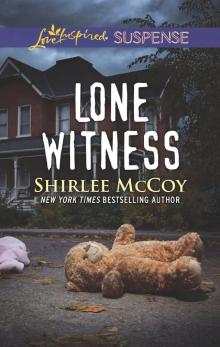 Lone Witness
Lone Witness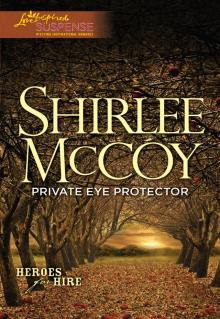 Private Eye Protector
Private Eye Protector Valiant Defender
Valiant Defender Running Scared
Running Scared Dangerous Sanctuary
Dangerous Sanctuary Capitol K-9 Unit Christmas: Protecting VirginiaGuarding Abigail
Capitol K-9 Unit Christmas: Protecting VirginiaGuarding Abigail Hidden Witness
Hidden Witness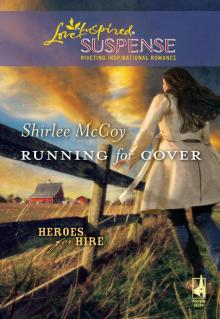 Running for Cover
Running for Cover Gone
Gone Valley of Shadows and Stranger in the Shadows: Valley of ShadowsStranger in the Shadows
Valley of Shadows and Stranger in the Shadows: Valley of ShadowsStranger in the Shadows Home with You
Home with You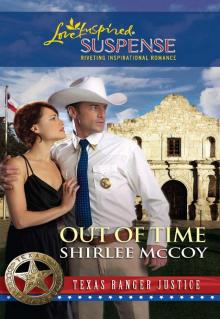 Out of Time
Out of Time Deadly Christmas Secrets
Deadly Christmas Secrets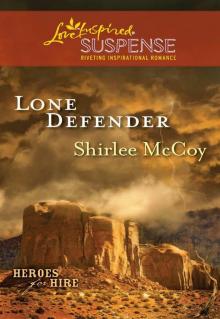 Lone Defender (Love Inspired Suspense)
Lone Defender (Love Inspired Suspense)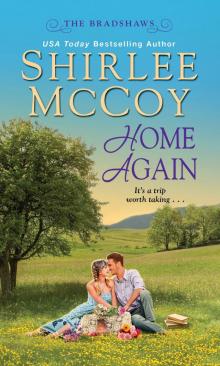 Home Again
Home Again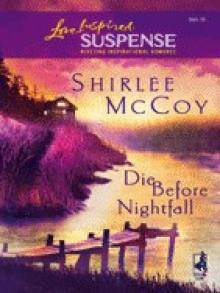 Die Before Nightfall
Die Before Nightfall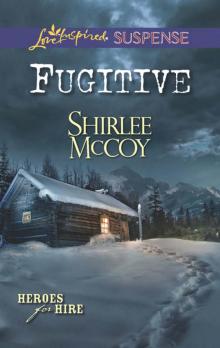 Fugitive
Fugitive Deadly Vows
Deadly Vows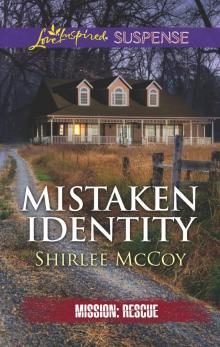 Mistaken Identity
Mistaken Identity Capitol K-9 Unit Christmas
Capitol K-9 Unit Christmas The Christmas Target
The Christmas Target SB01 - The Guardian's Mission
SB01 - The Guardian's Mission Sweet Surprises
Sweet Surprises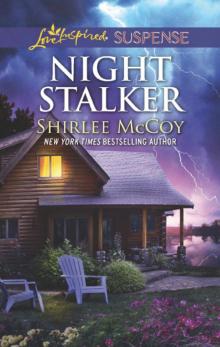 Night Stalker
Night Stalker The Cottage on the Corner
The Cottage on the Corner Love Inspired Suspense January 2014
Love Inspired Suspense January 2014 0373447477 (R)
0373447477 (R) Love Inspired Suspense March 2015 - Box Set 1 of 2: Protection DetailHidden AgendaBroken Silence
Love Inspired Suspense March 2015 - Box Set 1 of 2: Protection DetailHidden AgendaBroken Silence SB03 - The Defender's Duty
SB03 - The Defender's Duty Love Inspired Suspense June 2015 - Box Set 2 of 2: Exit StrategyPaybackCovert Justice
Love Inspired Suspense June 2015 - Box Set 2 of 2: Exit StrategyPaybackCovert Justice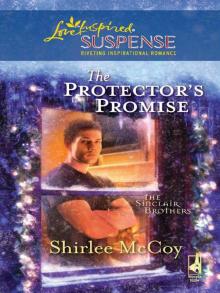 The Protector's Promise (The Sinclair Brothers)
The Protector's Promise (The Sinclair Brothers) Bodyguard
Bodyguard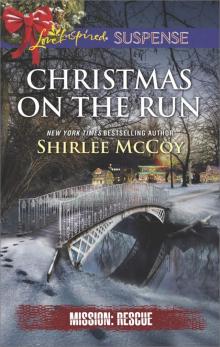 Christmas on the Run
Christmas on the Run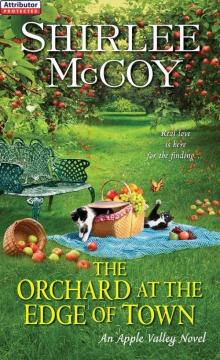 The Orchard at the Edge of Town
The Orchard at the Edge of Town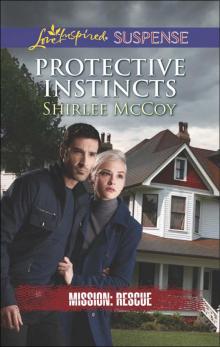 Protective Instincts
Protective Instincts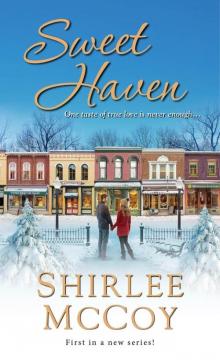 Sweet Haven
Sweet Haven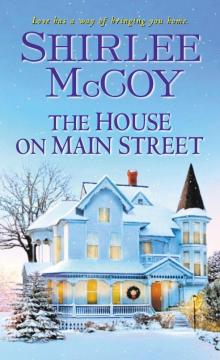 The House on Main Street
The House on Main Street Her Christmas Guardian
Her Christmas Guardian Undercover Bodyguard
Undercover Bodyguard